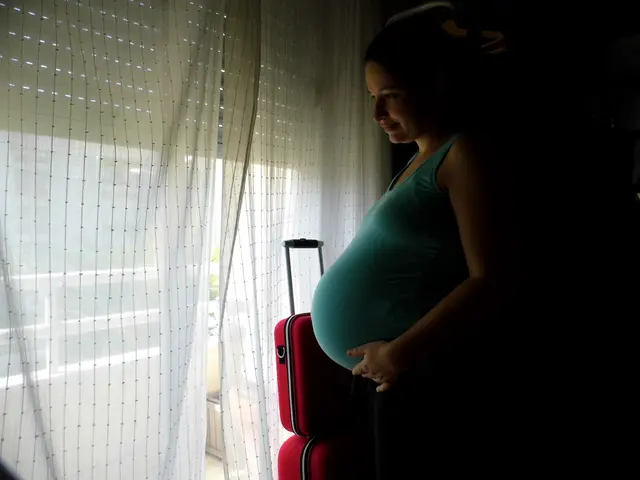HHS reconsiders termination of employment for numerous government healthcare employees
Fired and Rehired: NIOSH Employees in the Crosshairs of Federal Shifts
In a twist of bureaucratic twists and turns, the Department of Health and Human Services (HHS) has reinstated 328 federal employees who were on the chopping block, including those dedicated to screen "black lung" disease in coal miners and health issues in 9/11 first responders. These employees work under the National Institute for Occupational Safety and Health (NIOSH), a division of the Centers for Disease Control and Prevention (CDC) that focuses on preventing and responding to work-related illnesses.
This recent development comes after the Trump administration aimed to slash the majority of NIOSH's workforce, as part of a larger plan to downsize the federal workforce. Hundreds of NIOSH staffers received termination letters in April and May, but some were temporarily reinstated to complete certain tasks while their terminations remained in effect for June. However, on Tuesday, HHS’ acting chief human capital officer, Tom Nagy, informed some employees that their terminations were "hereby revoked."
Health Secretary Robert F. Kennedy Jr. confirmed at a House budget hearing on Wednesday morning that 328 NIOSH employees had been reinstated. Approximately a third of them work at a facility in Morgantown, West Virginia, and another third work in Cincinnati, where NIOSH operates two facilities. The Trump administration remains committed to supporting coal miners and firefighters, as outlined by a CDC spokesperson.
The Morgantown facility is home to NIOSH’s Respiratory Health Division, which oversees a program offering free X-rays to identify "black lung" in miners. A U.S. district judge in West Virginia ordered HHS on Tuesday to restore the division and continue its health surveillance in coal miners. Rep. Riley Moore, R-W.Va., stated at the House budget hearing that 111 NIOSH employees in Morgantown were reinstated this week.
As part of the reinstatements, HHS also brought back 15 employees at the World Trade Center Health Program, which covers treatment for cancer, asthma, post-traumatic stress disorder, and other 9/11-related illnesses. The program's future has been unstable for the past few months due to the Trump administration's back-and-forth on staffing changes, making it difficult to enroll members and confirm that their treatments are covered by federal funding.
In a Senate budget hearing on Wednesday afternoon, Kennedy commented that the requested budget cuts, which would have impacted the World Trade Center Health Program, "should not have been made." Given the recent instability, organizations such as 9/11 Health Watch are asking for more assurance from the Secretary for the continued operation of the World Trade Center Health Program without further interruptions.
While some employees have been reinstated, NIOSH Director John Howard's email sent Tuesday afternoon indicates that some positions are still being eliminated. The Trump administration has proposed consolidating NIOSH, along with other agencies, into a new division known as the Administration for a Healthy America. However, the plan has been temporarily halted due to a court order, preventing the Trump administration from making further changes[1][4].
[1] National Institute for Occupational Safety and Health (NIOSH) undergoes reinstatements and challenges: https://www.npr.org/sections/health-shots/2023/05/12/1141761396/niosh-reinstatement-trump-administration-layoffs[2] NIOSH Reinstates Coal Mine Black Lung Screeners: https://www.businessinsider.com/coal-mine-black-lung-screeners-niosh-reinstated-2023-5[3] International Association of Fire Fighters campaigns to restore funding for essential firefighter health and safety programs: https://www.iaff.org/news-and-events/news-stories/2023/05/iaff-campaigns-to-restore-funding-for-essential-first-responder-health-and-safety-programs/[4] American Industrial Hygiene Association launches campaign to restore NIOSH staff and funding: https://www.aiha.org/news/2023/may/aiha-responds-to-potential-niosh-cuts[5] NIOSH Director's Office remains at risk of elimination despite reinstatement of some positions: https://www.ucsf.edu/news/2023/05/108173/niosh-director-signs-letters-notice-potential-termination
- The 328 reinstated NIOSH employees will continue their work on preventing and responding to work-related illnesses.
- Capital is essential for funding research on chronic kidney disease, respiratory conditions, and eye health.
- In the workplace, wellness programs can help manage medical conditions and chronic diseases.
- The manufacturing industry should prioritize mental health therapies and treatments for its workers.
- The Trump administration's proposed consolidation of NIOSH could impact finance and energy sectors that rely on workplace safety guidance.
- Science and technology are key to developing sustainable living solutions for skin conditions and other health issues.
- The reinstatement of 9/11 first responder treatment staffers shows a commitment to healthcare and wellness.
- Retail and interior design businesses should prioritize creating a safe and inclusive workspace for employees.
- Cooking classes can teach workers about healthy cooking and diet management for certain medical conditions.
- The transportation sector needs to improve workplace safety to reduce accidents and minimize health risks.
- Leadership in organizations must address diversity and inclusion in the workplace to foster a positive work environment.
- CBD products can help manage chronic pain associated with some medical conditions, but their effectiveness and safety require further scientific study.
- The global healthcare industry is investing in smart home devices to improve patient care and support chronic disease management.
- Lifestyle choices play a significant role in preventing and managing chronic diseases, such as chronic kidney disease and respiratory conditions.
- The outdoor living trend promotes health and wellness by encouraging physical activity and environmental awareness.
- The food and drink industry should invest in research and development to create healthier alternatives and improve food safety.
- Family dynamics can be influenced by wealth management decisions, affecting overall well-being and financial stability.
- Home and garden stores can carry eco-friendly cleaning products to reduce chemical exposure and promote a healthier home environment.
- The home improvement industry can incorporate sustainable living practices and promote energy efficiency in their products and services.
- Baking classes can educate individuals about food allergies and sensitivities, promoting a safer and more inclusive food-making environment.
- Love and dating relationships can impact mental health and overall well-being, emphasizing the need for open communication and emotional support.
- Businesses must prioritize work-life balance to maintain a motivated and healthy workforce.
- Career development programs can help employees build skills, advance in their careers, and secure their financial future.
- Personal finance management is crucial for individuals to make informed decisions about their savings, investments, and expenses.
- Recipe books and global cuisines can inspire healthy and budget-friendly meal planning for families.
- Banking and insurance institutions should focus on providing affordable and accessible financing options for small businesses and entrepreneurs.
- Gadgets like smartphones and wearable devices can promote health and wellness by tracking fitness, sleep patterns, and stress levels.
- Gardening equipment and supplies can support sustainable living by promoting organic gardening practices and reducing chemical exposure.
- Sustainable living, technology, and healthy cooking can all contribute to reducing environmental impact and promoting a healthier lifestyle.
- Relationships, whether personal or professional, require constant communication, empathy, and flexibility to maintain a harmonious and supportive environment.








